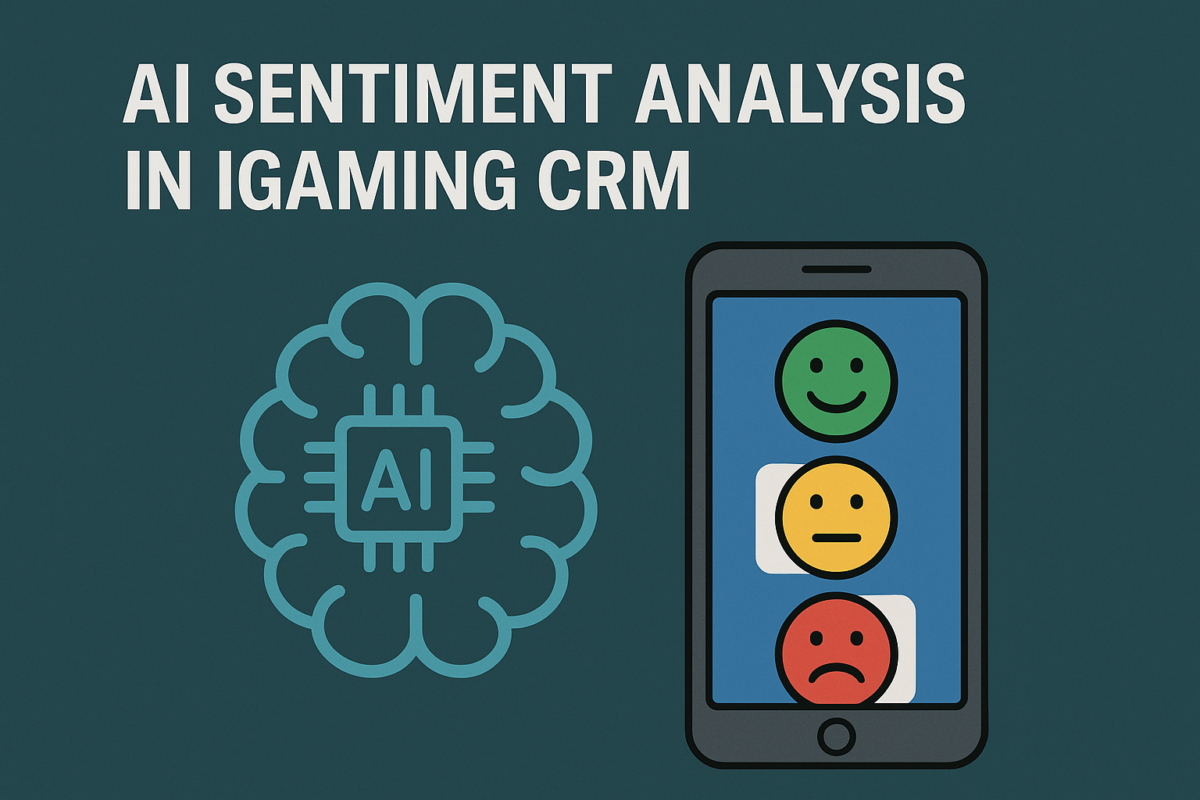AI Sentiment Analysis in iGaming CRM

Introduction
The iGaming industry is no longer driven purely by odds, it’s shaped by emotion, behavior, and precision analytics. For high-stakes platforms, success depends on understanding how players feel in real time, not just what they do. Enter AI-driven sentiment analysis, a powerful layer of intelligence within iGaming CRM software that enables smarter, faster, and more emotional player engagement.
In this blog, we explore how AI CRM analysis tools are revolutionizing real-time player behavior tracking, loyalty prediction, and game personalization by reading between the emotional lines.
What Is AI Sentiment Analysis?
AI Sentiment analysis, also known as opinion mining, is a form of natural language processing (NLP) that identifies emotions in text or voice data. In iGaming, this data can come from:
- Live chat support
- In-game messages
- Player reviews & feedback
- Voice interactions in support channels
- Forum and community engagement
Models interpret this data to classify AI sentiment analysis as positive, neutral, or negative, helping platforms adjust CRM strategies in real time.
ALSO READ: How to Get Investors Excited About Your iGaming Business
Why iGaming Sentiment Tools Are Game-Changers
High-stakes players expect immediate gratification and tailored experiences. If they’re frustrated, they’ll churn, often without warning. That’s where AI gaming insights shine.
Benefits of AI-Driven Sentiment Analysis in iGaming CRM:
- Predict churn before it happens
- Deliver emotional-based offers (bonuses, support, UX shifts)
- Improve customer service resolution times
- Optimize onboarding and tutorial paths
- Trigger loyalty campaigns for positive sentiment clusters
Real-Time Player Behavior AI: Going Beyond Transactions
Traditional CRMs focus on transactional behavior: bets, wins, losses. But that’s not enough in high-stakes environments. AI CRM analysis combines those metrics with emotional data to detect deeper motivations.
Example:
- Player A loses three games but shows “neutral” sentiment → No action needed.
- Player B wins but uses angry or sarcastic messages → Flag for potential churn risk.
This kind of real-time player analytics transforms CRM tools from trackers into predictors.
Key Features in iGaming CRM Software with Sentiment AI
Modern CRM gaming platforms integrating AI sentiment tools offer the following capabilities:
1. Emotionally Responsive Segmentation
Players are segmented not just by spending habits, but by emotional states:
- Engaged but frustrated
- Calm but inactive
- Happy but losing
This enables smarter intervention strategies.
2. Conversational AI for Support Triage
AI can auto-tag angry or distressed messages, escalating them to human agents immediately, improving response accuracy and retention.
3. Sentiment-Driven Loyalty Programs
Players expressing satisfaction are auto-enrolled in loyalty tiers or given referral incentives. Those showing negativity are offered retention triggers.
How Sentiment AI Powers iGaming Loyalty
iGaming loyalty AI isn’t just about points and levels, it’s about emotionally intelligent personalization. Sentiment tools help customize offers to each player’s current mood.
Loyalty Personalization Tactics:
- Positive sentiment → Surprise bonus or social badge
- Negative sentiment → Apology offer or exclusive invite
- Neutral sentiment → Gamification nudges (spin streaks, quests)
This makes CRM personalization more human-like, fostering deeper connections.
Machine Learning Gaming Use Cases
AI in iGaming CRM doesn’t stop at just classification. It uses machine learning to detect patterns across millions of data points.
Examples of ML-powered sentiment systems:
- A player who becomes sarcastic before churning
- Specific games causing negative sentiment spikes
- Chat patterns indicating upcoming rage quits
These predictive insights allow platforms to adjust game recommendations, offer types, or UX flows proactively.
High-Stakes Operators Leading the Way
Some of the top-tier platforms using AI for sentiment analysis have seen:
- 📈 25% increase in retention among players flagged for negative emotion
- ⏱️ 40% faster issue resolution via sentiment-based ticket routing
- 🎯 30% boost in bonus engagement through emotion-personalized offers
These metrics prove that emotion-aware CRM systems are not just hype, they’re ROI drivers.
Challenges in Sentiment Analysis for iGaming
While powerful, sentiment analysis in iGaming has hurdles:
- Multilingual complexity
- Sarcasm and slang detection
- False positives in emotional cues
- Privacy and data governance
Still, with domain-trained AI models, most of these issues are improving fast, especially in platforms purpose-built for iGaming CRM strategy.
Comparison Table: Traditional CRM vs AI Sentiment CRM
| Feature | Traditional CRM | Sentiment-Aware CRM |
| Player Segmentation | Behavioral only | Emotional + Behavioral |
| Real-Time Adaptation | Low | High |
| Loyalty Triggers | Manual | AI-Powered |
| Churn Prediction | Reactive | Predictive |
| Support Response | FIFO | Emotion-Based Triage |
FAQs
Q1: Does sentiment tracking invade user privacy?
A1: No. AI models analyze publicly shared or support-related content, not private conversations, with all data anonymized.
Q2: Is sentiment analysis 100% accurate?
A2: It’s evolving. Accuracy improves with larger, context-aware datasets, especially when trained on iGaming-specific interactions.
Q3: Can small operators use this tech?
A3: Yes. Many cloud-based CRM gaming platforms now offer plug-and-play AI sentiment modules for even small-to-mid operators.
Call to Action
Want to future-proof your high-stakes iGaming CRM strategy? It’s time to let AI sentiment tools work for you. Get in touch to explore how our platform can decode your players’ emotions, and boost loyalty while doing it.
